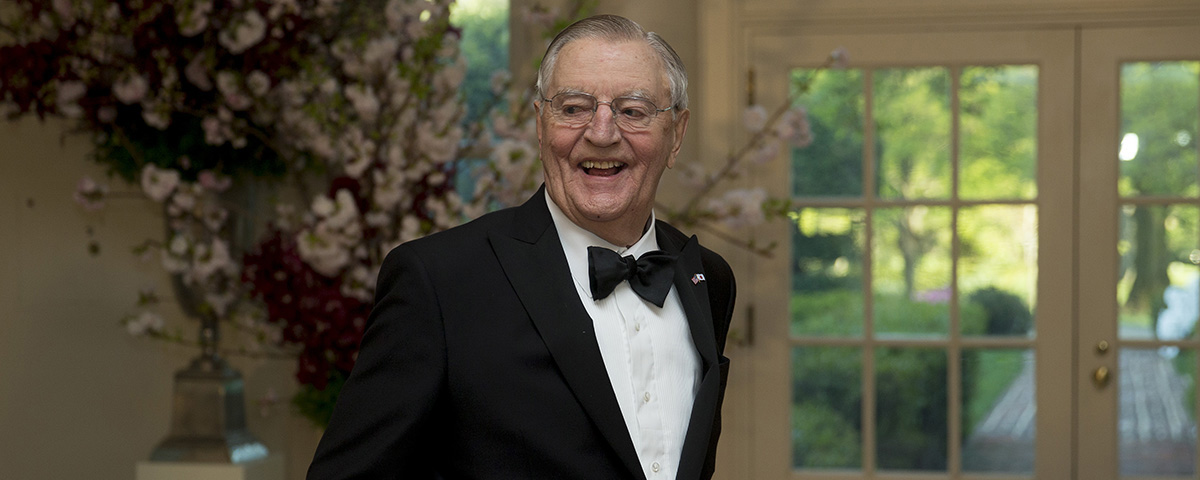WITH FORMER GEORGIA governor Jimmy Carter at the top of the ticket, Walter Mondale, a 12-year senator from Minnesota, was elected vice president of the United States in 1976, and ran for reelection in 1980 against the Republicans Ronald Reagan and George H.W. Bush. As the 1984 Democratic candidate for president, Mondale made history when he chose Geraldine Ferraro as his running mate—the first woman to run for vice president on a major party ticket. Mondale lost the election to incumbent President Ronald Reagan. From 1993 to 1996 he served as U.S. Ambassador to Japan. Today he is senior counsel for the law firm Dorsey & Whitney and a keen observer of the unfolding 2016 presidential race.
How have political campaigns changed since you ran for president?
There have been some good changes and bad changes. Digital media, new since I ran, offers citizens a much easier way to do research, to get new knowledge and to communicate. However, the advent of the Citizens United case has dangerously tipped the scales in favor of our richest citizens, bending the process toward big money and, sadly, reducing public trust in the process.
Every national election has its grassroots challengers. Do upstarts tend to share any unique qualities?
I believe an open political process that invites new candidates into the race is crucial. It allows the public to hear the issues, to watch the candidates as they handle challenges. Moreover, as in Jimmy Carter’s case, the new challenger became president. New challengers may or may not have special insights, but they have to prove themselves too.
We hear a lot about the Bush and Clinton “family dynasties.” Some say familiarity with a big job is an advantage, others say dynasties are a bad thing. What’s your view?
I think candidates from so-called family dynasties should be allowed to press their case. Whether they make it depends on them and their policy positions. They may find that this status might help or hurt them. We will see what happens.
Is the primary system broken? Some say the early ones are too influential and the process quickly becomes anticlimactic.
I spent a lot of my public life in Iowa and New Hampshire. I admire what those states do for our country, but I believe the “first states” status should be handed around and not held by the same states. This would take a lot of work, but I think that Iowa and New Hampshire as “first states” present some problems. Neither has a significant minority population, and the South and the West are left out. And New Hampshire allows so-called independents to vote in either of the parties’ primaries, permitting adversaries of one political party to cross over and cause undeserved trouble for the candidates of the other party. Also, after years of nomination battles in these first states, persons in those states develop ways to manipulate the candidates. I remember candidates telling me that they had to pay disproportionate rents for signs posted at Democratic events. Pressure to hire local talent can limit the quality of a candidate’s choices. Once a state is picked for the special status of a first deciding state (Iowa and New Hampshire) and when they have had experience with that unique status, demands are made on the candidates—for speaking dates and other decisions, and even though nothing is said, the requests carry special weight. The people making the requests might affect the outcome of the caucuses or the primary.
You got a boost from your 1984 debate zinger aimed at Gary Hart—“Where’s the beef?” But do debates really help voters?
I think the debates are crucial—that’s why millions have been watching them. They inform the public. Most political rhetoric is contrived, written or structured in advance. These debates often lead to unprotected moments when the public might learn something important. We need the debates, and we should continue to think about how they, their participants and their formats can best serve the purpose of public education.
We hear that “the best and the brightest” don’t get into politics anymore—that it is an ugly business coarsened by big money. Do you agree?
We often do get the best and the brightest—Barack Obama, Bill Clinton, Jimmy Carter, for example. They are brilliant, as have been many other presidents. But big money especially is undermining the integrity of the public process and posing enormous risks to the honesty of the electoral process. Reform is desperately needed.
What did you like most—and least—about campaigning for president?
I loved being around people and friends and having my one big chance to make my case to the American people, and I hated to raise money.
Originally published in the April 2016 issue of American History magazine. Subscribe here.





